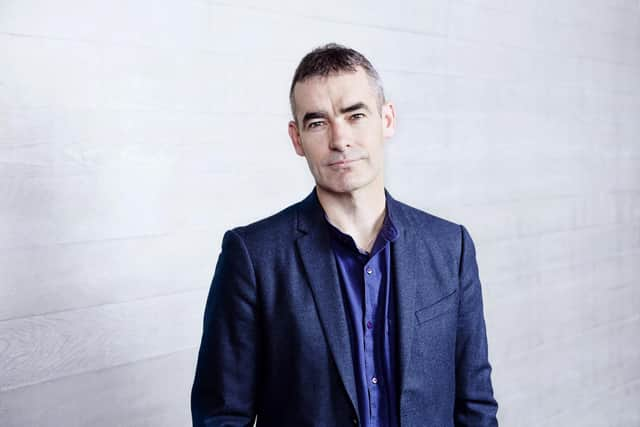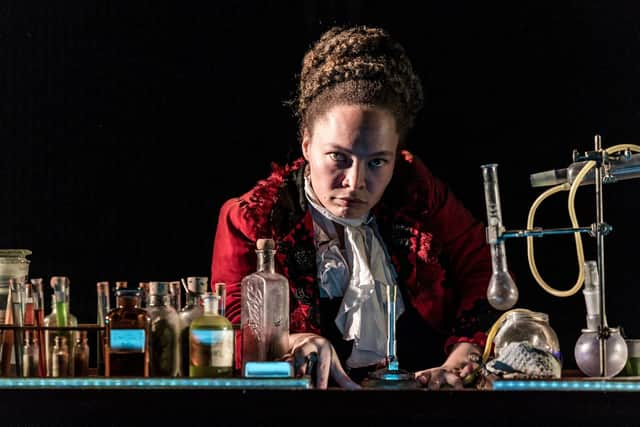National Theatre's Rufus Norris talks touring productions, supporting arts in schools and creating theatre with local communities after visit to Doncaster
Last month the National Theatre’s production of a radical new take on Robert Louis Stevenson’s classic story Jekyll & Hyde visited schools in Doncaster as part of a tour reaching 10,500 secondary school students around the country.
The aim of the tour, undertaken in partnership with Cast in Doncaster as part of the NT’s ongoing work to support arts and creativity in schools, was to help develop new audiences for live theatre across the UK.
Advertisement
Hide AdAdvertisement
Hide AdThe NT’s artistic director Rufus Norris travelled up from London in order to attend a performance at McAuley Catholic High School and to meet with the team at Cast, one of the NT’s six partner theatres in its Theatre Nation project, a touring programme that seeks to increase and sustain public engagement with theatre.


“I was really bowled over by the show itself and the way it tackles issues such as feminism, misogyny and the impact of the internet which felt really pertinent for the teenagers watching,” says Norris. “It was great to be in an audience of young people, some of whom may not have been to the theatre before.
“I tend to be inevitably fairly ‘landlocked’ so whenever I get out for a day it is always completely memorable and incredibly energising to realise all this stuff is going on that is part of our mission – it is hugely positive and inspiring.”
Yorkshire is well represented in the Theatre Nation programme – Wakefield Theatre Royal is another partner alongside Cast in Doncaster; the rest of the group comprises the Lowry in Salford, Sunderland Empire, Wolverhampton Grand Theatre and the Queen’s Theatre in Hornchurch.
Advertisement
Hide AdAdvertisement
Hide AdBetween 2017 and 2021 the programme, which aims to broaden the audience for drama through touring productions, initiatives in schools and the creation of theatre with local communities, exceeded its target of reaching 200,000 people from under-engaged areas and demographics.


The actual figure was 215,987 in terms of audiences, participants and artists – and it is clearly work of which Norris is very proud.
“We are the National Theatre and our national work is extremely important to us,” he says. “Over 50 per cent of our audience is outside London, so the relationships with our partner theatres are really crucial. We can only do that work in partnership – it is only effective if you are connecting with people in those communities and who understand those communities.”
Over the various lockdowns of the past two years the NT threw open its digital doors, providing a bit of a lifeline for theatre lovers who were able to access a back catalogue of some of their very best NTLive productions of recent years.
Advertisement
Hide AdAdvertisement
Hide Ad“We had 16 million people watching NTatHome – that was a terrific and very popular way of responding in the short term,” says Norris. “That digital work continues but theatre is a live art and so it very important for us to also get our live work out there.
“That is partly done through touring those big shows to regional theatres – we are midway through a nationwide tour of The Curious Incident of the Dog in the Night Time at the moment – but it is also about how we link those theatres up with schools and young people to help them fulfil their roles as community centres.”
In Doncaster, Cast is also involved in another collaborative NT project – Public Acts which was launched back in 2016. The programme creates “ambitious new works of participatory theatre” through long-term partnerships with theatres and community organisations.
“We make connections with a series of community groups around wherever the production is going to be, working with them over a couple of years building up to the performance and then continue to work with them afterwards,” says Norris. “The feedback we get from the participants is very positive and it does have a huge benign ripple effect.”
Advertisement
Hide AdAdvertisement
Hide AdCast’s production of The Doncastrian Chalk Circle, a collaboration with playwright Chris Bush and six organisations across Doncaster, was originally slated for 2020. Due to the pandemic, it has been pushed back to this summer but the community cast and the creative team kept the momentum going.
“What was really wonderful was that all the community groups and members putting it together didn’t let the energy go,” says Norris. “Instead, they worked together on a couple of other projects including a podcast series, a film we made with the Guardian and last summer we did a show called Wild Heather with local performers.”
The Doncastrian Chalk Circle will finally get its premiere in August. “There are over a hundred people involved – a handful of professional actors and the rest are community actors. It will be a community production on an epic scale.”
The work that the NT, and regional theatres, do with schools, reaching out to young people, particularly after the disruption in their education over the past two years, is invaluable. It has become increasingly important as the cuts to arts education continue and creativity is side-lined in the curriculum.
Advertisement
Hide AdAdvertisement
Hide Ad“Arts education has just been so worn down,” says Norris. “The endless focus on ‘core subjects’ is so limiting. It is just so important that young people learn to express themselves and be creative and adaptable, learn to think outside the box and work in teams.
“There are so many life skills that the arts can teach you. And we are uniquely positioned to engender that in young people through encouraging them to watch theatre and participate in it themselves. I believe very profoundly that it’s a crucial part of what our education should be about.”
Post-pandemic, theatres are working hard to rebuild their audiences and it is a long, slow, challenging road. Revenue has been lost, funding is scarce.
While overall, Norris is cautiously optimistic about the future he says that he is “very conflicted” about some elements of the Government’s ‘levelling up’ project, about which there has been much talk.
Advertisement
Hide AdAdvertisement
Hide Ad“The principle of it is good – there has been an imbalance historically and any initiative to address that has to be welcomed,” he says. “However, it is a complex picture – Arts Council England have said that they are going to be investing outside of London and there will be a 15 percent cut to the arts in London but those things are interdependent.
“All the work we do in London helps to subsidise our nationwide work. If our funding is cut, it impacts on our ability to deliver that work. I think a simplistic binary approach is counter-productive, it has to be viewed with sophistication. We want people all over the country to have access to the arts.”
The Curious Incident of the Dog in the Night-Time is at Leeds Grand Theatre, April 12-16. The Doncastrian Chalk Circle, Cast, Doncaster, August 27-29.
Support The Yorkshire Post and become a subscriber today. Your subscription will help us to continue to bring quality news to the people of Yorkshire. In return, you'll see fewer ads on site, get free access to our app and receive exclusive members-only offers. Click here to subscribe.
